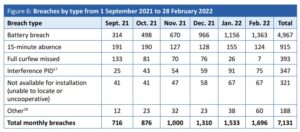- BY Charlotte Rubin

GPS tagging of foreign offenders “not yet achieving its aims”
THANKS FOR READING
Older content is locked

A great deal of time and effort goes into producing the information on Free Movement, become a member of Free Movement to get unlimited access to all articles, and much, much more
TAKE FREE MOVEMENT FURTHER
By becoming a member of Free Movement, you not only support the hard-work that goes into maintaining the website, but get access to premium features;
- Single login for personal use
- FREE downloads of Free Movement ebooks
- Access to all Free Movement blog content
- Access to all our online training materials
- Access to our busy forums
- Downloadable CPD certificates
The electronic monitoring of foreign national offenders is riddled with flaws which can be traced back to Home Office underfunding and inefficiency, an independent report has found. The Chief Inspector of Borders and Immigration, David Neal, says the system for electronic tagging and GPS tracking of FNOs “cannot yet demonstrate it is achieving [its] aims”.
When a foreign citizen is convicted of a crime in the UK, deportation may not be explicitly mentioned during sentencing, but they may still be liable at the end of their sentence. Deportation proceedings often take a long time; in the meantime, FNOs are either held in detention centres or released on bail. In the latter case, electronic monitoring has been mandatory since last August, unless an exemption or exception applies. In practice, as the report shows, there are not enough ankle tags to go around, so “it has only been possible to begin to prepare for highest harm individuals” to be tagged.
A 12-month trial of using electronic monitoring for asylum seekers arriving by small boat began on 15 June. This was the same week as the first flight to Rwanda was planned, which is no coincidence: the Home Office says the threat of removal to a strange country may lead to “an increased risk of absconding”. The inspection took place in March/April 2022 and so did not cover this pilot.
How does electronic monitoring work?
As the Inspector’s report outlines, the Home Office used radio frequency-based electronic monitoring until January 2021. Such a system records the proximity of the person wearing the tagging device to a unit placed somewhere in the home. FNOs subject to this kind of tagging generally had a curfew, and the Home Office was able to check that they were home at the required time.
GPS devices have now been introduced. These can track a person’s location at all times, rather than only note whether the person is at home or not. The biggest flaw of the GPS tracking system, from the Home Office point of view, is that the devices can run out of battery. Indeed, almost 70% of breaches of tagging conditions in the last six months have been battery breaches.

The GPS devices are fitted on the ankle; they cannot be taken off. The Home Office planned to introduce a second type of tracker, a “non-fitted portable device” which is less invasive and requires the person wearing it to verify that they have it with them during the day using “facial recognition or fingerprints”. However, after almost two years of efforts to procure the NFDs, the mission was aborted due to security concerns. A new procurement process has started, but approval can take months, and in the meantime there is no alternative to fitted devices. Therefore, only people with a high risk of harm and absconding are currently monitored, even though the Home Secretary technically must monitor all FNOs.

FNOs subject to electronic monitoring are followed by the Electronic Monitoring Hub, a specialised team dedicated solely to ensuring FNOs’ compliance with reporting and tagging conditions whilst they await deportation. The report shows that Hub staff face numerous difficulties preventing them from doing their job properly.
Operational problems
First of all, the Hub is understaffed. The projection for November 2021 was 40 full-time staff members, but they had only about half that number until March 2022. “Managers acknowledged that low staffing levels were negatively impacting existing staff, noting this resulted in staff having to rush work, staying over their contracted hours and requests made to work on weekends.”
What’s more, Hub staff are not trained appropriately, and are often ill-equipped to deal with the wealth of responsibility that managing and tracking FNOs entails:
Staff consistently said they had not been provided with adequate training for their roles. Managers said that staff training had been impacted by COVID-19 public health restrictions preventing face-to-face learning.
Among the areas that staff considered they required further training were on responding to representations and legal challenges (pre-application protocol letters and judicial reviews), in particular assessing independent medical evidence, vulnerability, Convention rights and harm levels. Use of harm levels by Hub staff was still in development at the time of the inspection. Managers acknowledged that ‘The staff have received little to no formal training’.
As a consequence, the Hub suffered significant delays. For example, emails with a five-day target for responses were six weeks in arrears.
The report also expresses concerns about data protection and sharing, stating that Hub staff rely on unsecured software to manage their cases. A senior manager confirmed that accuracy and efficiency of data was hard to achieve: “It’s an imperfect number of [IT] systems all coming together to provide the data. It’s early days for what it means, what it tells us, and process changes we need to make as a result”.
The Inspector made five recommendations for improvement, including ways to ensure data protection and implementing a quality assurance framework to evaluate decision-making. The Home Office has accepted all recommendations, noting that the system is still in its infancy.
This may be true, but the use of GPS tags has more than doubled since the introduction of the electronic monitoring duty, from 716 people in September 2021 to 1,696 by February 2022. These numbers are only set to rise, and the concerns expressed in the Inspector’s report will affect a growing number of people.
